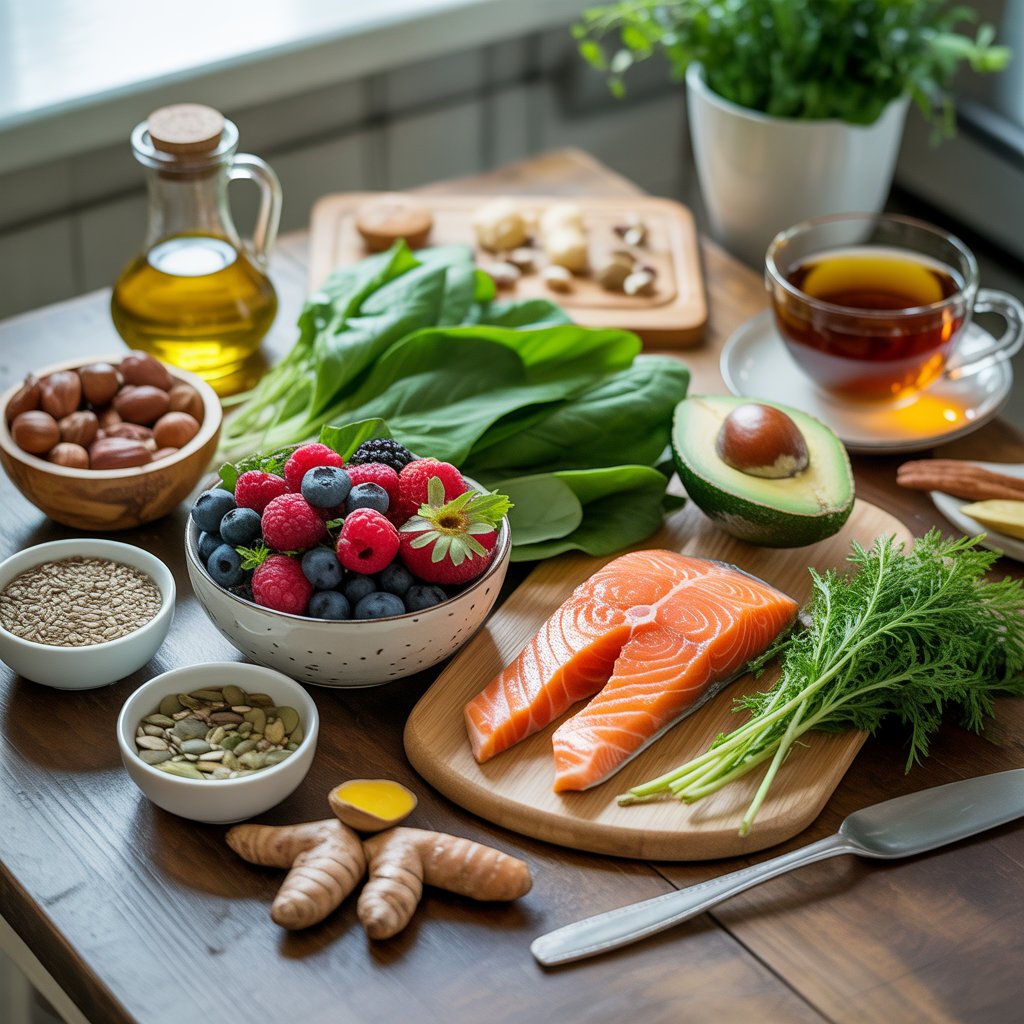Introduction: Why You Need Anti-Inflammatory Foods

Today we are gonna talk about the most popular topic “Anti-Inflammatory Foods’ If you’ve been feeling bloated, tired, or dealing with aches and pains, trust me you’re not alone. Inflammation is your body’s natural defense system, but when it sticks around for too long, it can do more harm than good. Chronic inflammation is linked to serious conditions like heart disease, diabetes, arthritis, and even weight gain.
The good news? You can fight inflammation naturally with the foods you eat. Yes, your grocery list can literally help heal your body. In this guide, I’ll walk you through everything you need to know about anti-inflammatory foods what they are, why they matter, the best ones to eat, and even how to build a daily meal plan around them. Let’s dive in!
What Are Anti-Inflammatory Foods?
Simply put, anti-inflammatory foods are foods that help lower inflammation in your body. They’re packed with antioxidants, vitamins, minerals, and healthy fats that calm down those inflammatory processes.
Think of it like this: processed and sugary foods fuel the fire, while anti-inflammatory foods put out the flames. Trust me, the difference you’ll feel after switching to these foods is incredible.
Why You Should Care: Benefits of Anti-Inflammatory Foods

Adding anti-inflammatory foods to your diet can change your health in ways you won’t believe. Here are just a few benefits:
- Lower Risk of Chronic Disease – Studies show an anti-inflammatory diet can reduce your risk of heart disease, diabetes, and certain cancers.
- Better Joint Health – If you suffer from arthritis or sore muscles, these foods can help ease discomfort.
- Improved Gut Health – A healthy gut equals less inflammation throughout your body.
- Weight Control – Many of these foods are low in unhealthy fats and refined carbs, which helps with weight management.
- Boosted Energy – When your body isn’t fighting constant inflammation, you feel more energized and focused.
Trust me, once you start incorporating these foods, you’ll notice a real difference in how you feel.
The Ultimate List of Anti-Inflammatory Foods
1. Fruits: Nature’s Sweet Medicine
- Berries (Blueberries, Strawberries, Blackberries) – Rich in antioxidants like anthocyanins, which fight inflammation.
- Oranges & Citrus Fruits – High in vitamin C, which strengthens your immune system.
- Grapes – Contain resveratrol, a compound known for its anti-inflammatory benefits.
Pro Tip: Add berries to your oatmeal or smoothie for a quick anti-inflammatory boost.
2. Vegetables: The Green Powerhouses
- Leafy Greens (Spinach, Kale, Swiss Chard) – High in fiber and antioxidants.
- Broccoli – Contains sulforaphane, a compound that reduces inflammation and protects your cells.
- Brussels Sprouts – Rich in antioxidants and vitamins like C and K.
Trust me, a plate full of greens is one of the best investments in your health.
3. Spices and Herbs: Flavor with a Purpose
- Turmeric – The superstar of anti-inflammatory spices thanks to curcumin.
- Ginger – Helps with digestion and reduces inflammation.
- Garlic – Packed with compounds that boost immunity and fight inflammation.
Pro Tip: Add turmeric to your soups or ginger to your tea for extra benefits.
4. Healthy Fats: Good Fats That Heal
- Olive Oil – A staple in the Mediterranean diet, proven to reduce inflammation.
- Avocados – Full of heart-healthy monounsaturated fats and antioxidants.
- Nuts & Seeds – Almonds, walnuts, chia seeds, and flaxseeds are loaded with omega-3s.
Trust me, swapping out unhealthy oils for olive oil is one of the easiest changes you can make.
5. Protein Sources: Fuel Your Body Right
- Fatty Fish – Salmon, sardines, mackerel these are inflammation-fighting superstars.
- Plant-Based Proteins – Lentils, beans, and chickpeas are amazing options.-
(we have a separate full detailed blog on Plant-Based proteins you can click on this and go through well)
Foods That Cause Inflammation (What to Avoid)
Not all foods are created equal. Some can trigger inflammation in your body, such as:
- Processed meats (hot dogs, sausages)
- Refined carbs (white bread, pastries)
- Sugary drinks and snacks
- Fried foods and fast food
Trust me, cutting these out will make a huge difference in how you feel almost overnight.
How to Add Anti-Inflammatory Foods to Your Diet (Made Simple)
Here’s how to make it easy:
- Swap white rice for quinoa or brown rice.
- Use olive oil instead of vegetable oil.
- Add berries and nuts to your breakfast.
- Sneak turmeric and ginger into soups, smoothies, and teas.
Sample 1-Day Anti-Inflammatory Meal Plan
To make your life easier, here’s a quick plan you can follow tomorrow:
- Breakfast: Oatmeal topped with blueberries, chia seeds, and a drizzle of honey.
- Lunch: Grilled salmon with quinoa and steamed broccoli.
- Snack: A handful of walnuts and a cup of green tea.
- Dinner: Lentil soup with turmeric and a side salad with olive oil dressing.
10 FAQs About Anti-Inflammatory Foods
1. What are the top 10 anti-inflammatory foods?
Blueberries, salmon, spinach, broccoli, turmeric, ginger, olive oil, nuts, avocados, and garlic.
2. Can anti-inflammatory foods help with weight loss?
Yes! These foods are nutrient-dense, high in fiber, and help control cravings naturally.
3. How long does it take to reduce inflammation with diet?
If you consistently eat an anti-inflammatory diet, you can notice results like less bloating and more energy in as little as 2–3 weeks.
4. Are eggs anti-inflammatory?
Eggs can be part of an anti-inflammatory diet, especially if they’re organic and rich in omega-3s.
5. Is coffee inflammatory or anti-inflammatory?
Good news coffee can have anti-inflammatory effects due to its antioxidants. Just avoid too much sugar or cream.
6. What drinks help reduce inflammation?
Green tea, turmeric tea, and plain water are excellent choices for reducing inflammation.
7. Do anti-inflammatory foods help with arthritis?
Absolutely. Foods like fatty fish, berries, and turmeric are especially helpful for joint health.
8. Are dairy products inflammatory?
Some people experience inflammation from dairy, especially if they’re lactose intolerant. Opt for unsweetened yogurt or plant-based alternatives if needed.
9. Can anti-inflammatory foods improve skin health?
Yes! Berries, avocados, and nuts provide antioxidants and healthy fats that support glowing, clear skin.
10. What’s the easiest way to start an anti-inflammatory diet?
Start by making small swaps replace refined carbs with whole grains, add a handful of berries to your breakfast, and cook with olive oil instead of vegetable oil.
Final Thoughts: Start Today for a Healthier Tomorrow
Inflammation doesn’t have to control your life. By making simple changes to your diet and adding these powerful anti-inflammatory foods, you can take charge of your health. Trust me, your body will thank you!
Start small swap out one meal a day, and before you know it, these healthy habits will stick. Your future self will be so grateful.
Thank yo for your precious time hope you liked this blog and if you have any questions feel free to ask in comment section . – Team – fat fighters